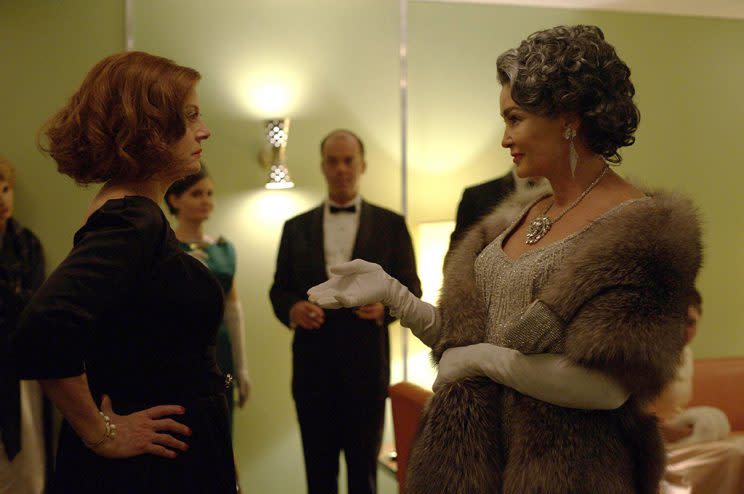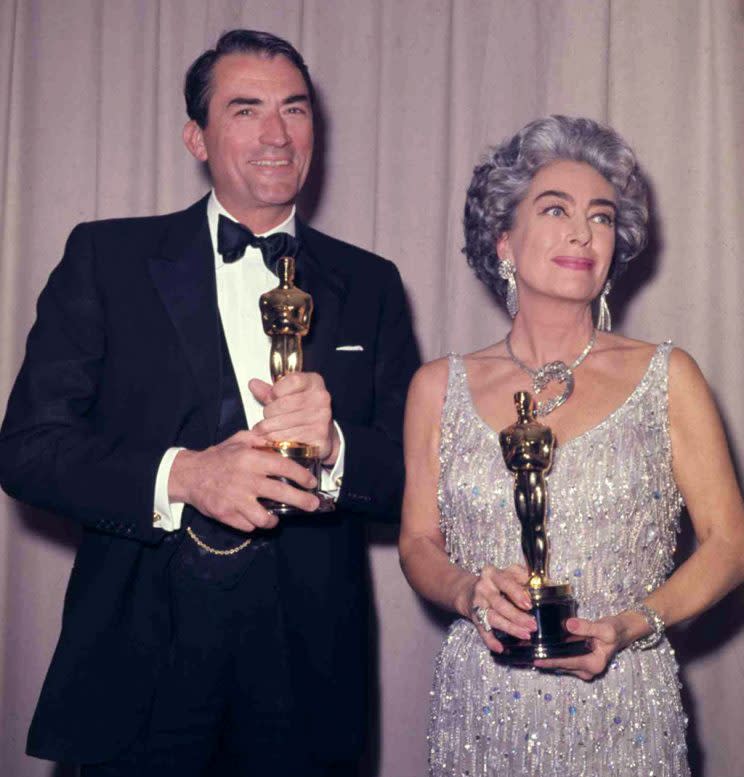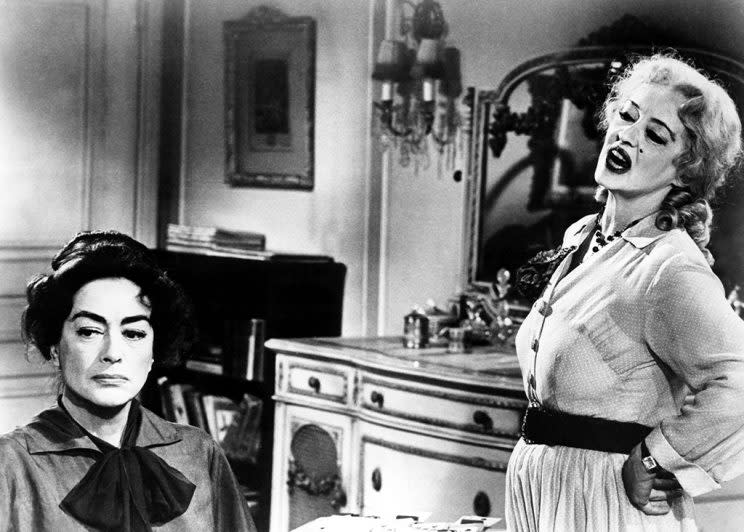'Feud: Bette and Joan' and an Oscar Clash for the Ages: The Real Story Behind Sunday's Academy Awards Episode

In March 1963, New York Times film critic Bosley Crowther mocked Bette Davis in a pre-Oscars commentary, while tipping his hat to her competitors in the Best Actress category. “Three other nominees — Anne Bancroft for The Miracle Worker, Geraldine Page for Sweet Bird of Youth, and Lee Remick for Days of Wine and Roses — are respectable,” he wrote. “The nomination of Bette Davis for her performance in Whatever Happened to Baby Jane? must have been meant as a joke.”
One can only imagine Joan Crawford’s glee at reading such a barb. Crowther’s kicker, though mean, feels like an impersonal aside, an afterthought. It is nothing compared to the cruelty unleashed by Crawford onto Davis, after her Baby Jane co-star got the Best Actress nod that she coveted for their 1962 horror film. Crawford’s kind of wickedness takes forethought, and the co-star’s public showdown at the 35th annual Academy Awards on April 8, 1963, was deliberate.
It was also very personal, to judge by the FX series, Feud: Bette and Joan, starring Susan Sarandon and Jessica Lange as Davis and Crawford. In Sunday night’s episode, “And the Winner Is…,” director Ryan Murphy recreates the vicious scene at the 1963 Academy Awards, from the women’s attention-getting red-carpet arrivals (both wore gowns by legendary designer Edith Head) to their tensest moments backstage, where Crawford imperiously held court while Davis alternately held hands with her confidante Olivia de Havilland (Catherine Zeta-Jones), smoked, and nervously listened for her name to be announced. Which, of course, it never was. The Best Actress honor instead went to Bancroft, who, as a favor, sent Crawford to accept the award in her place.

The paperback version of Bette & Joan: The Divine Feud by Shaun Considine is getting a nice sales bump for its re-creations of scenes and dialogue that will seem familiar to viewers of last night’s episode. For instance, Considine writes of Bette’s promise to her earlier two Oscars that she would “bring them home a baby brother.” And if you were wondering whether Crawford really did call Geraldine Page (Sarah Paulson) to suggest saving her the trouble of accepting her own Oscar, should Page win it, the answer is yes. According to Page’s account in the book: “Actually I was relieved. That meant I wouldn’t have to fly all the way to California or spend a lot of time looking for a new dress to wear.”
For the occasion of accepting the trophy, Crawford wore a gown of beaded silver, powdered her hair to match, and showered herself in diamonds. She looked every inch a winner herself — that was the point, after all, to appear victorious over Davis. Of course, “And the Winner Is…” is really a story about losing and loss. It’s about the fickleness of legend — about larger-than-life stars reduced to pettiness because of jealousy and loneliness. One of the most powerful moments in the episode comes after Crawford calls Page to make her proposition. “You’re actually going to let that high-strung show pony represent you at the Oscars?” Page’s boyfriend asks after she hangs up the phone. “Well, she needs it,” Page replies. “And besides, Hollywood should be forced to look at what they’ve done to her.”
It’s a fascinating comment on today’s celebrity culture. And while the public loves a good catfight, it’s also hard to imagine a modern-day feud that comes close to the war waged between these two women. (“Becky with the good hair” seems school-girlish in comparison.) Interestingly, 1963 was also the year that second-wave feminism was born. The day before Crawford took Davis down, the New York Times reviewed Betty Friedan’s groundbreaking book The Feminine Mystique, recapping the author’s take on the problem afflicting so many American women: “They try to relieve their feelings of depression and emptiness by seeking ‘strained glamour,’” the reviewer wrote. “The core of her thesis is that woman’s problem today is not sexual, but a problem of identity.”

Bette and Joan were far from housewives. But they both were in the middle of identity crises and still battling ageism and sexism. They were women growing older and, with every passing year, less relevant. For them, the issue wasn’t “the problem that has no name,” but rather the trappings of fame and the desperate need to preserve their legacies. Joan Crawford was the star of that Oscars night, and she is the star of this episode, too, mounting her attack against Davis with the help of gossip queen Hedda Hopper (Judy Davis). The fact that they were successful implicates the entire studio system, the media, and the public at large. It implicates us too.
Watch Bancroft accept Bancroft’s award in 1963:
Anyone interested in the history of the Academy Awards would appreciate the online archive of photo highlights throughout the years at www.oscars.org. But search for the 1963 ceremony, and you’re likely to see a charming black-and-white picture of smiling presenters Frank Sinatra (also the year’s host) and Donna Reed leading the parade of “memorable moments.” Of course, it was another famous duo who really made history that year, and thanks to last night’s episode of Feud, that moment gets a big lift in the pop-culture consciousness.
Minutes before accepting the Oscar for Best Actress on Bancroft’s behalf, Crawford took a drag from her cigarette. When Bancroft’s name was announced, she stomped out the embers with her heel and walked onstage as the world — and Davis — watched.
As Oscars director Richard Dunlap later recalled in Considine’s book: “Bette bit into her cigarette and seemed to stop breathing. She had lost the award. Joan was out there — suddenly it was her night.”
Murphy orchestrates the scene masterfully. After all, what could be more memorable than the idea of an actress who once burned so brightly, stepped on and snuffed out?
Read more from Yahoo TV and Movies:
